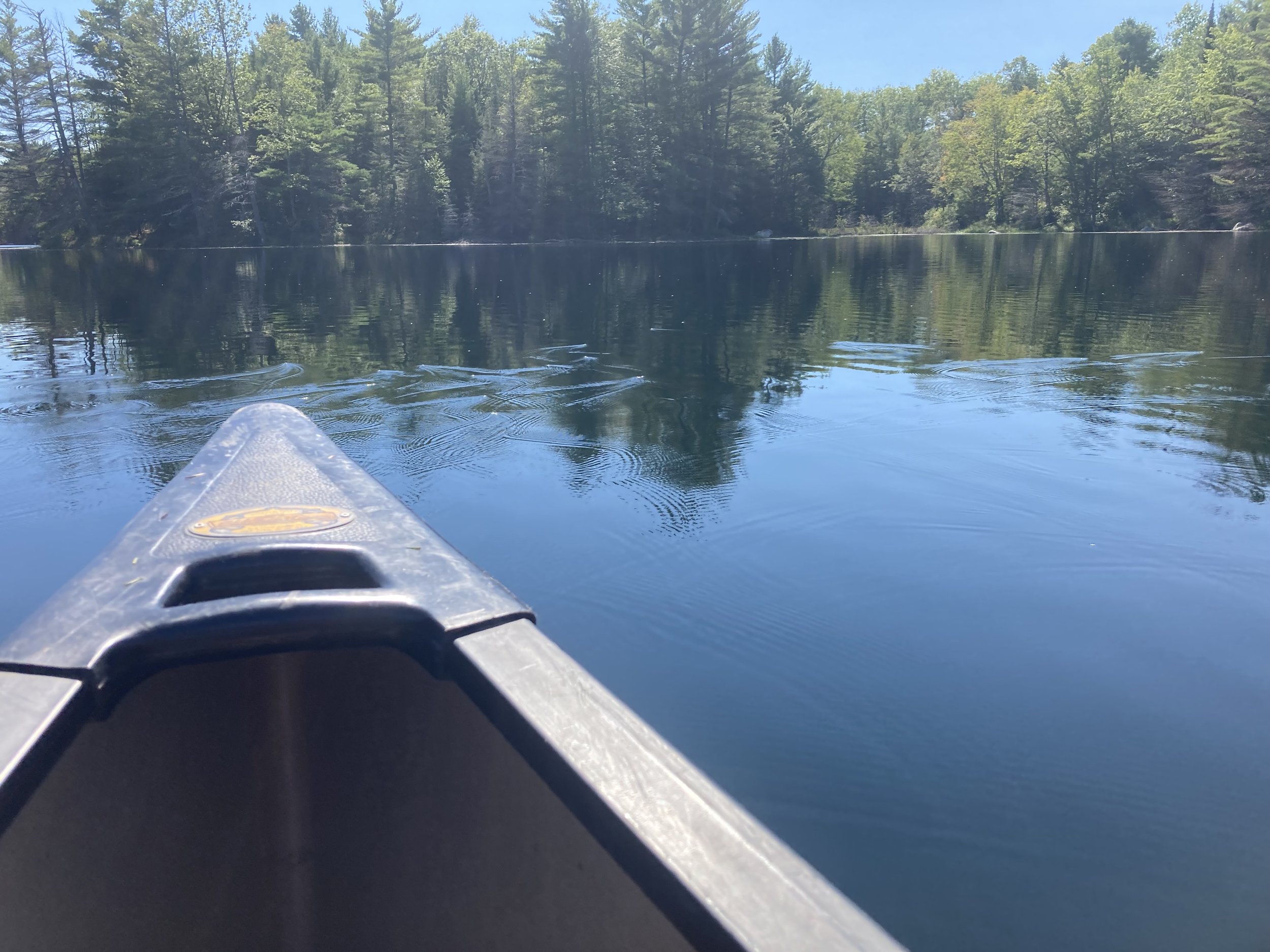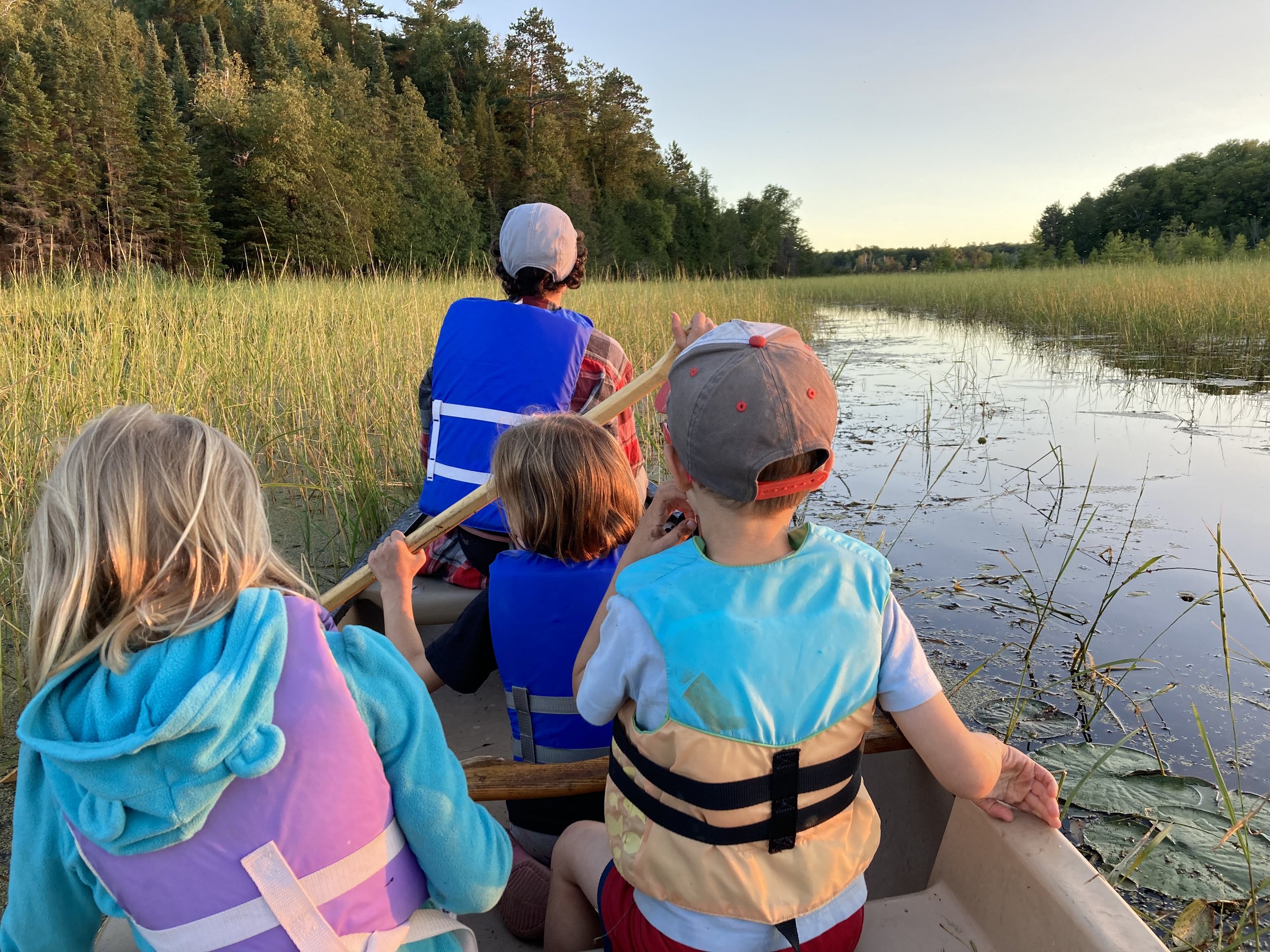Bittersweet Lakes Family Paddle
With our first family paddling outing under our belts, we were hungry for more adventure on the water. The Northwoods’ plethora of lakes provided ample opportunity and we set out on the chain of four small remote lakes comprising the Bittersweet Wild Lakes Area. Despite our paddling inexperience, we escaped to the solitude normally experienced miles (and many portages) into remote wilderness like the Boundary Waters.
The short portages mixed up the adventure.
Background
The Bittersweet Wild Lakes Area was a perfect outlet to avoid crowds with minimal effort on a holiday weekend. The lakes are situated in a state natural area, with none of the lakes allowing motors. Yet parking is just off Hwy 70 north of Minocqua, if you’re willing to portage 1/4 mile to the put-in on the first lake, Prong Lake. For those with high clearance vehicles, you could unload your boat right on Bittersweet Lake, the second of four lakes, after a slow going mile-long drive. The portage from Prong Lake to Bittersweet Lake and the portage from Bittersweet Lake to Smith Lake are both 300 feet. These portages were so short that the kids spotted the lake as we exited the water. The final portage from Smith Lake to Oberlin Lake is 600 feet.
These four lakes host five reservable campsites within the Northern Highland-American Legion State Forest:
Sunken Rowboat campsite is on Prong Lake and only requires a couple minutes of paddling.
Big Rock and Trapper’s Cabin campsites are on Bittersweet Lake.
Loon Song campsite is on Smith Lake.
Sunset Point campsite is on Oberlin Lake
All warmed up
We had Rice Creek completely to ourselves!
After an adventure on the water on the Escanaba, Lost Canoe, and Pallette Lakes plus a beautiful paddle across Big Lake into the Rice Creek State Natural Area over the previous two days, we were ready to tackle the remoteness of the Bittersweet Lakes for the first time.
Greeting campers loaded to the gills as we set out on Prong Lake.
We choose the 1/4 mile warmup portage to Prong Lake to fully experience all four lakes. While my husband unloaded the canoe, I ran a mile down the road to check out the landing on Bittersweet Lake out of curiosity. I happened to see a group loaded to the brim paddling back from their campsite. By the time I returned to the car and we hauled in our canoe 1/4 mile to Prong Lake (30 acres), they met us there as well.
Scoping out the campsites
A conversation piece for a chair at the Sunset Point campsite.
Within minutes of setting out, we distinguished brightly colored hammocks from a group at the first campsite, Sunken Rowboat. We paddled leisurely hugging the eastern shoreline taking in the full experience. Soon we arrived at our first portage connecting to the largest of the four lakes, Bittersweet Lake (104 acres). On Bittersweet Lake, we continued along the eastern shoreline and discovered a secret passage to a pond. We identified plenty of raccoon tracks, who had been feasting on the clams they saw through the clear water.
There’s even a view from the compost latrine!
As we reached the northern shoreline, Trapper’s Cabin campsite looked like a beautiful campsite on a peninsula. It also was still occupied so we continued along the northern shoreline and portaged into Smith Lake (43 acres). Within minutes, we had transversed the lake and reached the fourth and final lake, Oberlin Lake (46 acres). The portages were cool through the deep woods of hemlock, white pine, and maple oak.
Compared to our prior paddle adventures, we observed an absence of waterfowl with the exception of seven red ducks on Oberlin Lake. Immediately after making this observation an eagle soared directly over us and perched atop one of the many white pines. Since the Sunset Point campsite was unoccupied, we all unloaded to explore the campsite. The campsite had a beautiful lake view. A chair made from a white pine provided a good place to lounge. After a scavenger hunt for the compost latrine, we continued on.
Escaping the crowds
We opted not to go to the northern most side of Oberlin Lake since another paddler was enjoying the solitude fishing, the first paddler we had encountered since our put-in on Prong Lake. As we made our return trip, the lake shimmered in the full sun, mesmerizing us. We were serenaded by a lone loon while a bald eagle circled above. Thereafter, silence was broken by chipmunk chatter, distant bird calls, and occasional leaves rustling in the light breeze.
Back on Smith Lake, we followed the western shoreline past Loon Song campsite, completing our circunavigation of the lake. On Bittersweet Lake, it was a clean shot to Big Rock campsite, where we stopped for lunch overlooking the water. We inhaled the hemlock aroma fragrance between bites.
The only time any of us got our feet wet were when the kids elected to stand in the lake so minnows could nibble their feet. In some areas, lily pads were so thick that it seemed we could walk on the water and our paddles flung them as paddled, occasionally splashing water on us. We observed frogs, but were surprised we never glimpsed a single turtle or beaver hut. Plenty of insects danced on the water; however, we were thankful to not see a single mosquito!
Distinct character
All the campsites had tent pads, picnic tables, fire rings, and latrines - some even had a spectacular a view!
Each lake seemed to have distinct qualities. While Smith Lake and Oberlin Lake were clear, Bittersweet Lake had a green tint and the shoreline had small rounded stones along the shoreline. We even spotted some rocks with distinct striations from the varying water levels. Whereas on Prong Lake, boulders carried by glaciers thousands of years ago sprinkled the shoreline.
Ready for more
Our four hour adventure carried us just south of six miles including an one hour lunch break at one of the empty campsites, a perfect day outing. Now I’m confident our family could take on an overnight paddle adventure. A few items that I would like to bring for an overnight paddle adventure include dry bags for all our clothes and sleeping bags, wrist compass, detailed map on waterproof paper, ropes to tie off during stops and to secure all dry bags, waterproof cell phone case, and portage wheels. Next up, Sylvania Wilderness, where I’m looking forward to how many of the 34 lakes we can tackle in a single weekend!
Related:







